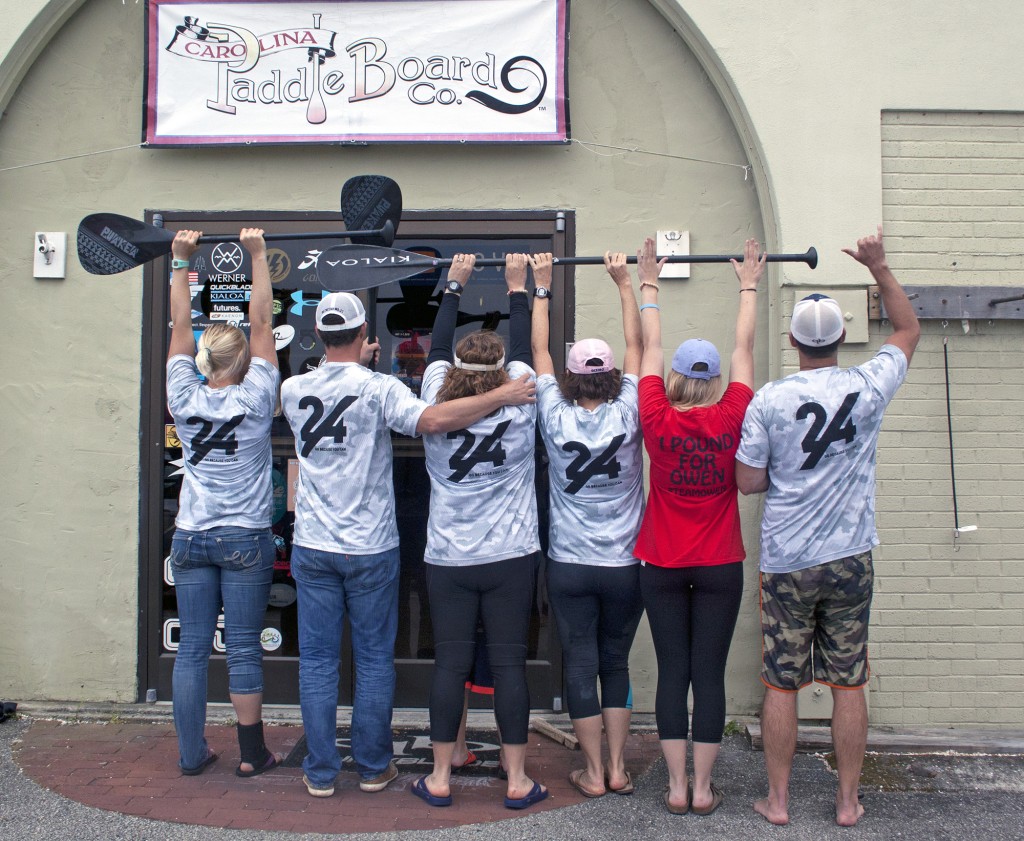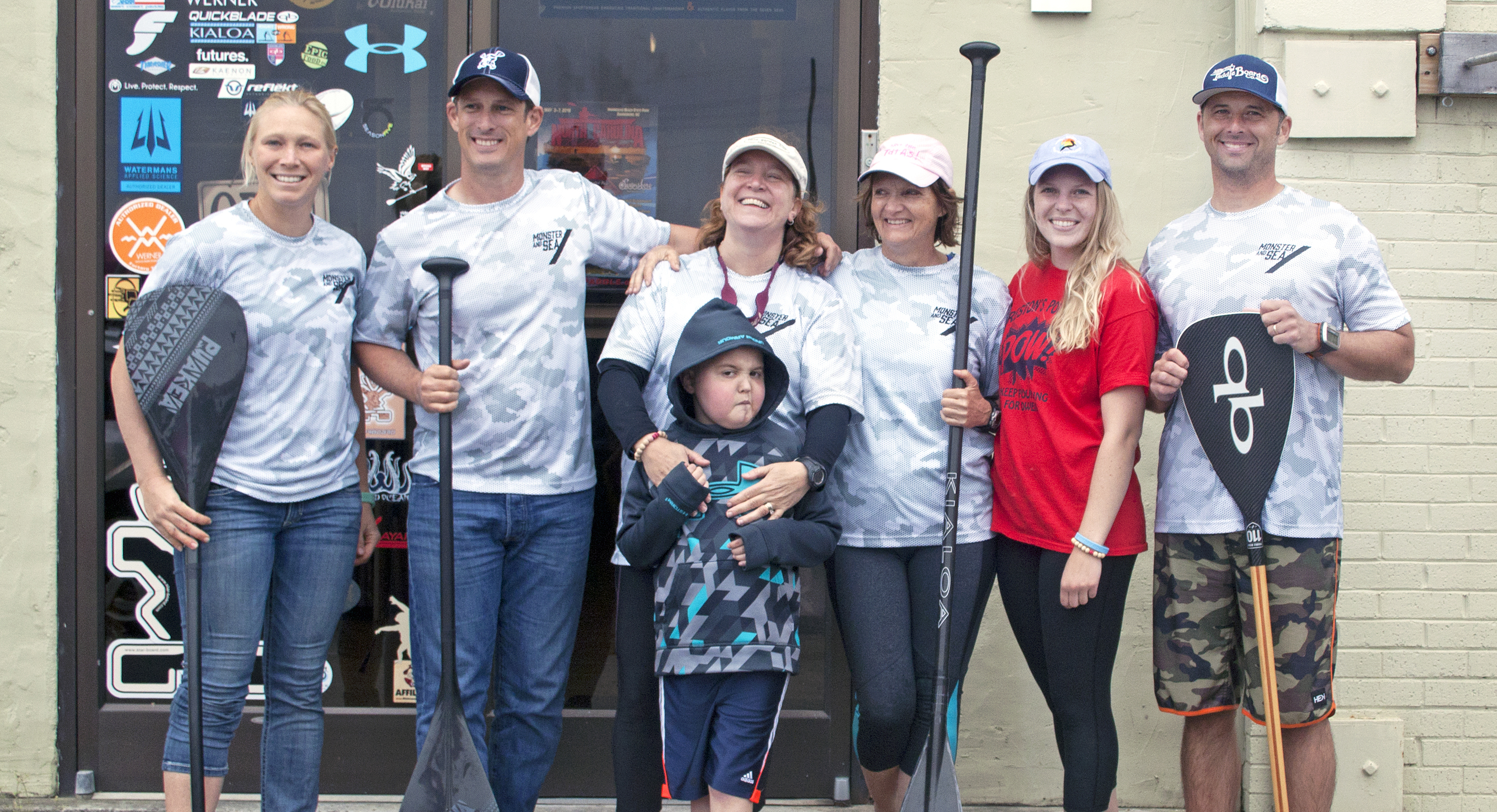In the final hours of a day-long paddleboard fundraiser, participant John Beausang tried to lift himself off his board onto the dock to get a few minutes rest. He was so fatigued, he tumbled into the 62-degree water and sprawled there in what he called “a manatee impression.”
“My whole body was just enflamed and hot and sore, so it was like an ice bath,” he said.
Beausang was one of six local paddleboarders who took turns stroking around Wrightsville Beach for 24 hours from Friday, March 25 to March 26 to raise more than $3,000 for a Wilmington child battling brain cancer.
The participants — Beausang, James Bain, April Zilg, Barry Blackburn, Tracy Skrabal and Nancy Preston — divided into three teams and paddled Wrightsville Beach’s waters in two-hour shifts from noon Friday to noon Saturday.
The paddle was part of a national event called the 24 Go Because You Can. Seattle resident Troy Nebeker created the event last year in his hometown with the goal of raising money and support for local families battling cancer. This year, paddlers in six other communities, including Wrightsville Beach, organized their own events.
Wrightsville Beach’s involvement resulted from a serendipitous combination of events. Beausang, who other paddlers have called the “mayor of stand-up paddleboarding,” found out about Nebeker’s 24-hour paddle fundraiser. Just as he was planning how to implement it in Wrightsville Beach, he learned Preston was trying to raise money for her nephew Owen, who is battling a rare form of brain cancer.
The solution was obvious for Beausang — he organized a 24-hour paddle in Wrightsville Beach to benefit Owen. Several local paddlers, like Wrightsville Beach Ocean Rescue director Dave Baker, showed support by joining the paddle, while others made online donations.
Seven-year-old Owen joined Preston and Skrabal for four of their eight hours on the water. He sat in the front of Preston’s kayak as they made loops around Harbor Island and Money Island. The group found ways to make the strenuous paddle entertaining, like scooping handfuls of floating seaweed to make slimy wigs and creating a game out of bumping the channel marker buoys.
After each two-hour shift, they returned to Carolina Paddleboard Company to grab food and a few minutes of sleep in hammocks. Even so, Skrabal said she only got about 90 minutes of sleep the whole event.
The overnight shifts, when the paddlers donned their headlamps, were also mostly uneventful, with the stillness only broken by snippets of Christmas carols emanating from a nearby boat. Skrabal and Preston even solved the dilemma of paddling during the UNC basketball game by getting score updates from passing strangers.
Skrabal said the 4 – 6 a.m. shift, which she thought would be the hardest, was actually her favorite. The wind died, she said, so “the water was slick calm and beautifully lit by the moon.”
Skrabal and Preston never strayed too far from the docks. While the heavy rain forecasted held off until the event was over, the conditions were far from easy, with 20-knot wind gusts Friday afternoon.
Beausang and Bain ventured further out during their 6 – 8 p.m. shift, and they encountered both nature’s beauty and danger. They were treated to a sunset that made the water and sky glow pink and orange and, as they were paddling back through Masonboro Inlet, they found themselves surrounded by wildlife: dolphins, fish, countless migratory bird species and at least one large shark.
As the hours passed, fatigue began to take its toll on the paddlers. Creating that type of exhaustion is the purpose of the 24-hour paddle, Nebeker said. The discomfort felt after such an extraordinary effort represents a small dose of the arduous journey undertaken by individuals and families fighting cancer.
“It gives you an appreciation for somebody who has to sit in that chair and get chemo, and then feel like crap for the next 24 hours because they’ve got garbage pumping through their veins,” he said.
The money raised won’t make much of a dent in each family’s medical bills, he admitted, but it isn’t really meant to. It’s intended to give the family relief from a few expenses and maybe let them plan a short vacation.
“They get the opportunity to be normal for a day,” he said. “They can put cancer on the back burner and be a family again.”
email [email protected]






Thanks Lumina News for the great coverage of this event. You all are an incredible gift to this community.